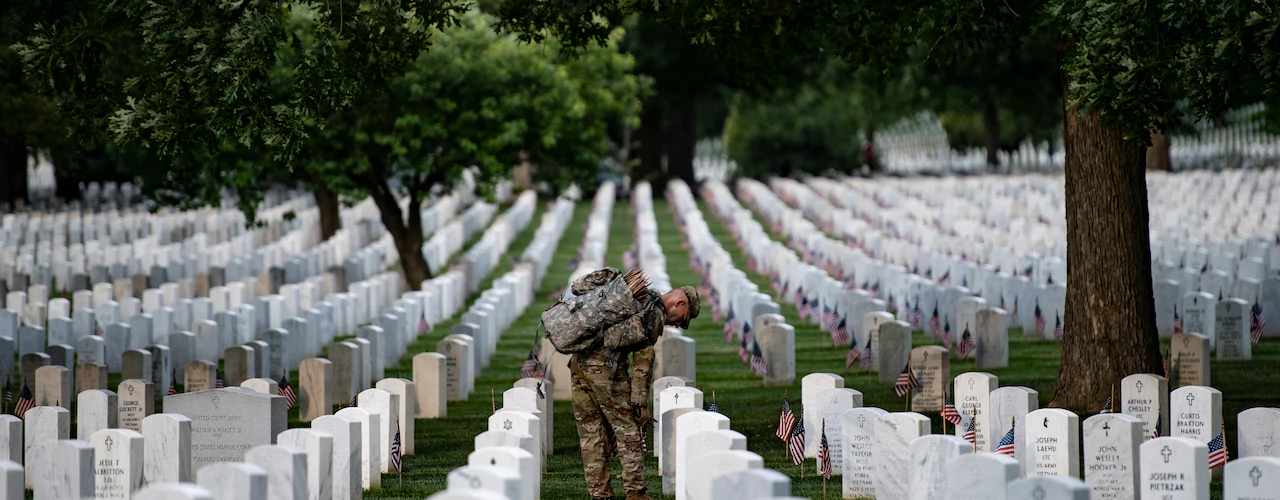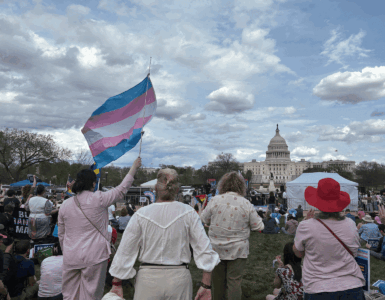Soldiers assigned to the 3rd U.S. Infantry Regiment, known as “The Old Guard,” place American flags at headstones in Arlington National Cemetery, Va. (Courtesy/Elizabeth Fraser, Army)
Veterans Day, observed annually on Nov. 11, is a day of national reflection and gratitude. Originally recognized as Armistice Day in 1919 to mark the end of World War I, it evolved into a broader celebration of all U.S. military veterans in 1954.
This federal holiday honors the courage, sacrifice, and service of those who have worn the uniform, protecting the freedoms that define the nation.
Across the country, Veterans Day is commemorated with parades, ceremonies and moments of silence. Families visit memorials and communities organize flag raisings and schools host assemblies to educate younger generations about the significance of military service. It’s a day to recognize not just the heroism displayed on the battlefield but also the enduring resilience and leadership veterans bring to their communities.
Howard University’s proximity to the nation’s capital underscores its storied connection to the military. Established in 1867 during the Reconstruction Era, the university has been at the forefront of training and preparing African Americans for roles of leadership and service—both in the civilian and military spheres.
“Being an ROTC student at Howard on Veterans Day means honoring the legacy of those who came before me, standing in spaces they were once excluded from, fighting for those who couldn’t, and carrying on the fight for those who did,” Baskin said.
Howard played a pivotal role in the military integration efforts of the 20th century. During World War I, it established one of the first Reserve Officers’ Training Corps (ROTC) programs at a Historically Black College or University (HBCU). This was not just an academic endeavor; it was a deliberate push to ensure that African Americans could serve as commissioned officers during a time when racism and segregation limited their opportunities in the armed forces.
The university’s military influence continued during World War II when it became a training ground for African American soldiers. Many of the renowned Tuskegee Airmen—trailblazing pilots who shattered racial barriers in the U.S. Army Air Corps—were either trained at or had strong ties to Howard. This included figures like Charles DeBow and Andrew D Turner, both Howard alumni and two of the first five Tuskegee Airmen to earn their wings.
“Being part of Detachment 130, where some of our very own Tuskegee Airmen once served, reminds me that no barrier is impossible,” said Cadet Lulu Mohamed. “As a proud member of the Arnold Air Society, Andrew D. Turner Squadron, I am inspired to uphold excellence and perseverance, carrying the legacy of its namesake, a Tuskegee Airman.”
Howard has also produced notable military leaders like General Benjamin O. Davis Sr., the first African American general officer in the U.S. Army, and Major General Charles Bolden, a Marine Corps aviator and former NASA Administrator. These leaders exemplify the university’s commitment to excellence and its enduring legacy in shaping the military.
For Master Sergeant Marcy Martinez a United States Marine Corps Veteran, Veterans Day holds a deep and personal meaning.
“Veterans Day is about honoring those who answered the call to serve—those who sacrificed their time, their safety, and in many cases, their lives,” Martinez said. “It’s a reminder that freedom isn’t free, and it’s an opportunity for all of us to show gratitude for those who protect it.”
Howard University continues to uphold this legacy. Today, its ROTC programs remain strong, commissioning a new generation of military leaders. In January 2023, the university achieved a significant milestone as the first HBCU to lead a University Affiliated Research Center (UARC), advancing military innovation and technology for the U.S. Air Force.
“Howard University’s ROTC programs are a testament to the strength of its legacy, producing leaders who are prepared to serve with honor and innovation,” said Kendall Franklin, Detachment 130 alum. “Achieving the distinction of being the first HBCU to lead a University Affiliated Research Center reflects our commitment to advancing military technology and shaping the future of our armed forces.”
As the nation pauses to honor its veterans, Howard University stands as a testament to the power of education, service, and leadership. Its contributions to the military have shaped not only the history of African Americans in the armed forces but also the broader narrative of resilience and progress in the United States.










Recent Comments